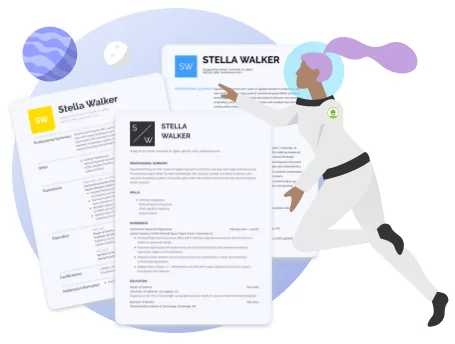A resume is similar to a curriculum vitae (CV) in many ways but is significantly shorter. A CV is a comprehensive document listing a job seeker’s academic and professional history. Meanwhile, a resume is a single-page snapshot of the skills and experiences that make a job seeker right for a certain job title. Here are three main resume formats that you can choose:
A chronological resume format, or reverse-chronological resume format, focuses on the work history of a job seeker and is best for people who have a lot of professional experience.
A functional resume format focuses on a job seeker's skill set and is competency-based. This resume format is best for those who have limited or patchy work experience.
A combination resume format balances work history and skills to provide a broad overview of a job seeker's competencies. This is a great option for those with limited work history and is generally received more positively by hiring managers.
Whichever resume format you choose, the ResumeNerd resume builder has a range of free resume templates you can select.

A great resume will open doors for you. If you want to level up your career and land your dream job, you need to tailor it carefully. A good resume will:
In short, a great resume is one of the most powerful tools you can add to your arsenal as a job seeker. If you optimize your resume to a specific job description and write a corresponding cover letter, your chance of landing a new job title will be much higher.
Whether you write your resume from scratch or use an online resume builder and professional resume templates, the perfect resume should include these sections:
Contact information
A resume header should include your full name and contact information, with your phone number, address and email address. You can also include your professional job networking links, such as a LinkedIn profile.
Resume summary or objective
This section will include either a resume summary or a resume objective statement, but not both. A resume summary should be a sum-up of your most relevant and impressive skills and experience. This makes it best for those with a lot of professional experience. This can be presented in sentences or bullet points. By contrast, a resume objective statement should be a statement of your career goals.
Skills section
The skills section of your resume should include 8 to 12 bullet points detailing the skills that make you right for the job you are applying for. Include technical skills, hard skills and soft skills to give a balanced view of your abilities.
Work experience
Your work experience section is the one that potential employers will be most interested in. Include up to 10 years of work experience and present it in reverse-chronological order. Provide examples of your most notable achievements in each role. Also include the company name, the job title you held and the dates of employment.
Education
As you gain work experience, your education section will become less important. Nonetheless, you should include your most relevant and advanced academic degrees and achievements. You can also create additional sections for professional certifications, internships and volunteer work if they are relevant to the job you are applying for. If you need inspiration, consider relevant resume samples to get ideas.
A cover letter is a single-page business letter that is created to support a resume as part of a job application. You should provide one with every application unless the job posting states that one is not required. When writing your cover letter, discuss experience and achievements that are relevant to the job description.
Yes. Your resume and cover letter templates should match. This may seem like a small detail, but it is the kind of detail that recruiters will notice. Well-matched cover letter and resume templates will give your job application a professional appearance.
Proper formatting is crucial for a resume. If you do not format your resume well, hiring managers will be put off. Your resume should have 0.5 to 1-inch margins and a professional, legible font in size 10 pt to 12 pt.